
Collect feedback via Slack notifications in your Laravel project
Photo by Austin Distel on Unsplash
How to create a feedback module in a Laravel project and receive a Slack notification when a message is submitted.
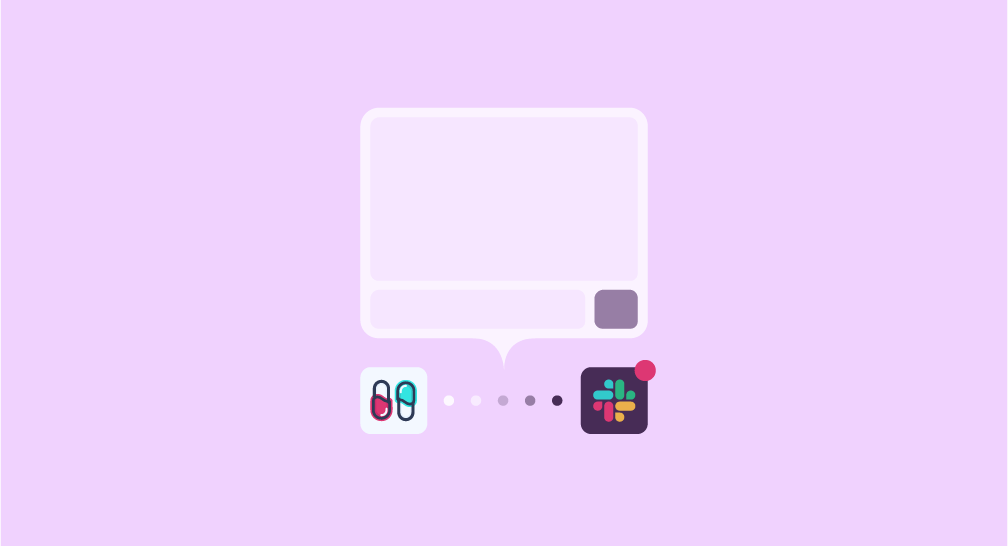
How to create a feedback module in a Laravel project and receive a Slack notification when a message is submitted.
A sample Laravel project can be found on this Github Repository. Find out more on Capsules or X.
It is common to come across a contact form or an email address on a website, allowing users to contact the site administrator. These forms typically request an email address, a subject, and a title. This article suggests a more open alternative to anonymity, replacing this standard format :
A button provides access to a form with a feedback field and, optionally, a field for an email address if a response to the message is desired. Upon submission, a Slack notification is automatically generated to inform the administrator. No email is generated, and no data is stored in a database.
Initially, only one route and one page are configured in our blank Laravel project.
routes/web.php
<?php
use Illuminate\Support\Facades\Route;
use Inertia\Inertia;
Route::get( '/', fn() => Inertia::render( 'Welcome' ) );
/resources/js/pages/Welcome.vue
<script setup>
import logotype from '/public/assets/capsules-logotype-background.svg';
</script>
<template>
<div class="w-screen h-screen flex flex-col items-center justify-center text-center bg-primary-white">
<img class="w-24 h-24" v-bind:src="logotype">
<h1 class="mt-4 text-6xl font-bold select-none header-mode" v-text="'Capsules Codes'" />
</div>
</template>
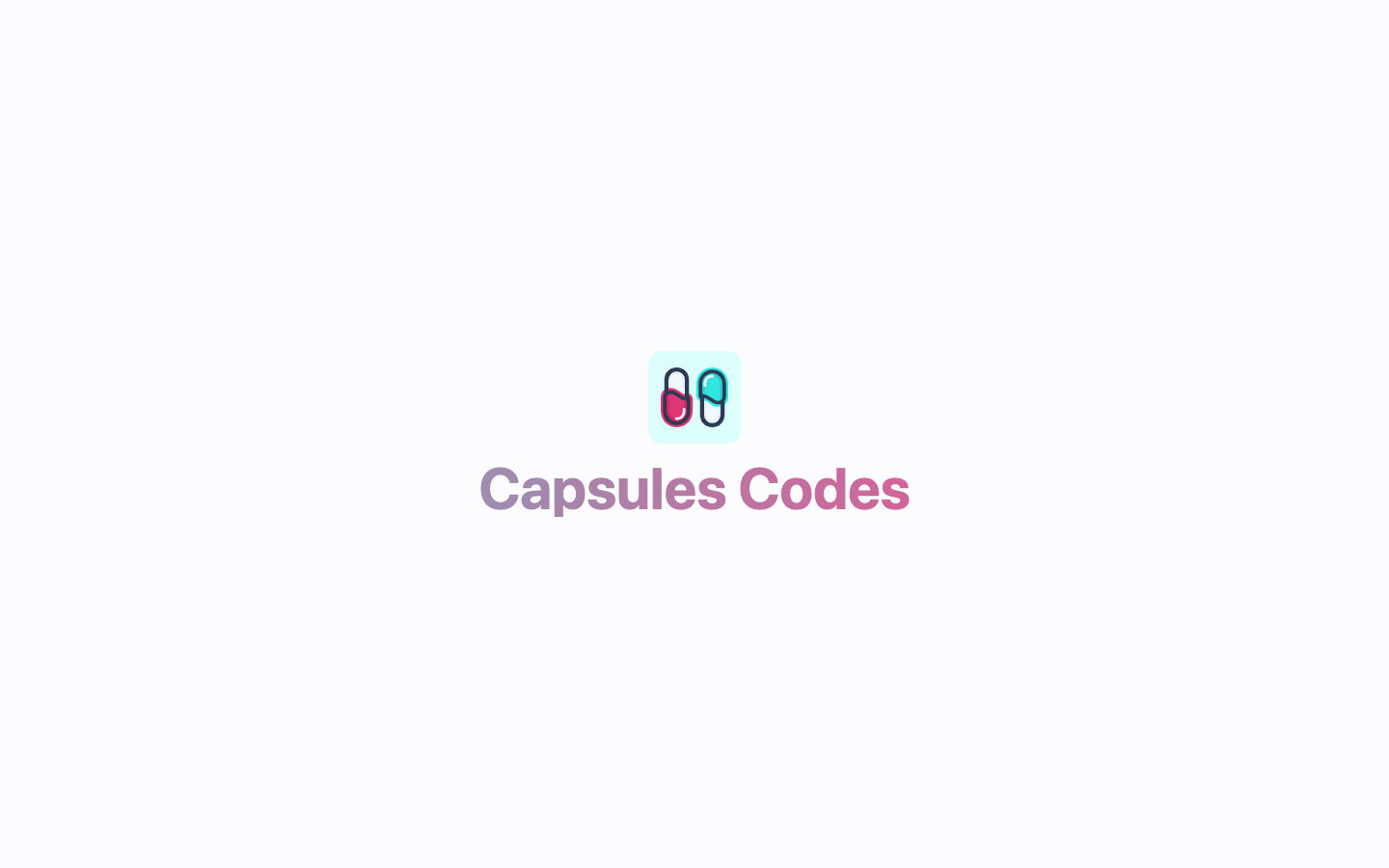
The feedback component can be entirely contained in a Vue file. The HTML structure includes a button and a form. Here is the content of the module.
resources/js/components/Feedback.vue
<script setup>
import { ref } from 'vue';
import { router } from '@inertiajs/vue3';
import logotype from '/public/assets/capsules-logotype.svg';
const isOpen = ref( false );
const isSent = ref( false );
const errors = ref( {} );
const message = ref( '' );
const email = ref( '' );
function toggle()
{
if( ! isOpen.value )
{
message.value = '';
email.value = '';
isSent.value = false;
errors.value = {};
}
isOpen.value = ! isOpen.value;
}
function submit()
{
errors.value = {};
const data = email.value ? { email : email.value, message : message.value } : { message : message.value };
router.post( '/feedbacks', data, { onError : error => { errors.value = error; }, onSuccess : () => { isSent.value = true; } } );
}
</script>
<template>
<div class="m-8 flex flex-col-reverse items-end space-y-reverse space-y-4">
<button class="w-12 h-12 flex items-center justify-center" v-on:click="toggle()">
<div v-show="! isOpen" class="w-full h-full rounded-xl bg-white flex items-center justify-center drop-shadow-2xl hover:bg-primary-blue hover:bg-opacity-5"><img class="h-8 w-8" v-bind:src="logotype"></div>
<div v-show="! isOpen" class="absolute top-0 left-0 w-full h-full rounded-xl bg-white flex items-center justify-center animate-ping opacity-50"><img class="h-8 w-8" v-bind:src="logotype"></div>
<svg v-show="isOpen" viewBox="0 0 24 24" stroke-width="1.5" stroke="currentColor" class="w-6 h-6 text-primary-blue"><path stroke-linecap="round" stroke-linejoin="round" d="M6 18L18 6M6 6l12 12" /></svg>
</button>
<div v-if="isOpen">
<div v-if="! isSent" class="font-mono rounded-xl bg-white drop-shadow-xl ">
<div class="p-2">
<form class="flex flex-col" v-on:submit.prevent="submit()">
<label for="message" hidden />
<textarea
id="message"
class="mb-2 p-2 outline-none rounded-md resize-none text-xs bg-slate-100"
v-bind:class="{ 'border border-solid border-red-500 text-red-500' : errors && errors[ 'message' ] } "
type="text"
cols="30"
rows="10"
v-bind:placeholder="'Your message'"
v-model="message"
/>
<div class="flex">
<label for="email" hidden />
<input
id="email"
class="px-2 grow outline-none rounded-md text-xs bg-slate-100"
v-bind:class=" { 'border border-solid border-red-500 text-red-500' : errors && errors[ 'mail' ] } "
type="text"
v-bind:placeholder="'Your email - Optional'"
v-model="email"
>
<button
class="ml-2 px-4 py-2 inline-flex items-center rounded-md text-sm font-medium text-primary-blue bg-primary-blue bg-opacity-50 hover:bg-opacity-60"
type="submit"
>
<p v-text="'Send'" />
</button>
</div>
</form>
<div>
<p v-for=" ( error, key ) in errors " v-bind:key="key" class="first:mt-4 ml-1 text-[10px] text-red-500" v-text="error" />
</div>
</div>
</div>
<div v-else class="font-mono p-4 flex items-center justify-center space-x-4 bg-white rounded-xl drop-shadow-xl">
<p class="w-full text-center text-xs text-primary-black" v-text="'Thank you for your feedback !'" />
<p v-text="'?'" />
<img class="h-8 w-8" v-bind:src="logotype">
</div>
</div>
</div>
</template>
This component represents a button that, when clicked, reveals a form through the isOpen variable. When the 'Send' button is clicked, the submit() method is called, sending a POST request to the /feedbacks route. If everything is in order, the isSent variable becomes true, and a thank-you message replaces the form. Otherwise, incorrect fields are highlighted in red.
Now, it's time to add this component to the Welcome page.
resources/js/pages/Welcome.vue
<script setup>
import Feedback from '/resources/js/components/Feedback.vue';
import logotype from '/public/assets/capsules-logotype-background.svg';
</script>
<template>
<Feedback class="fixed z-10 bottom-0 right-0" />
<div class="w-screen h-screen flex flex-col items-center justify-center text-center bg-primary-white">
<img class="w-24 h-24" v-bind:src="logotype">
<h1 class="mt-4 text-6xl font-bold select-none header-mode" v-text="'Capsules Codes'" />
</div>
</template>
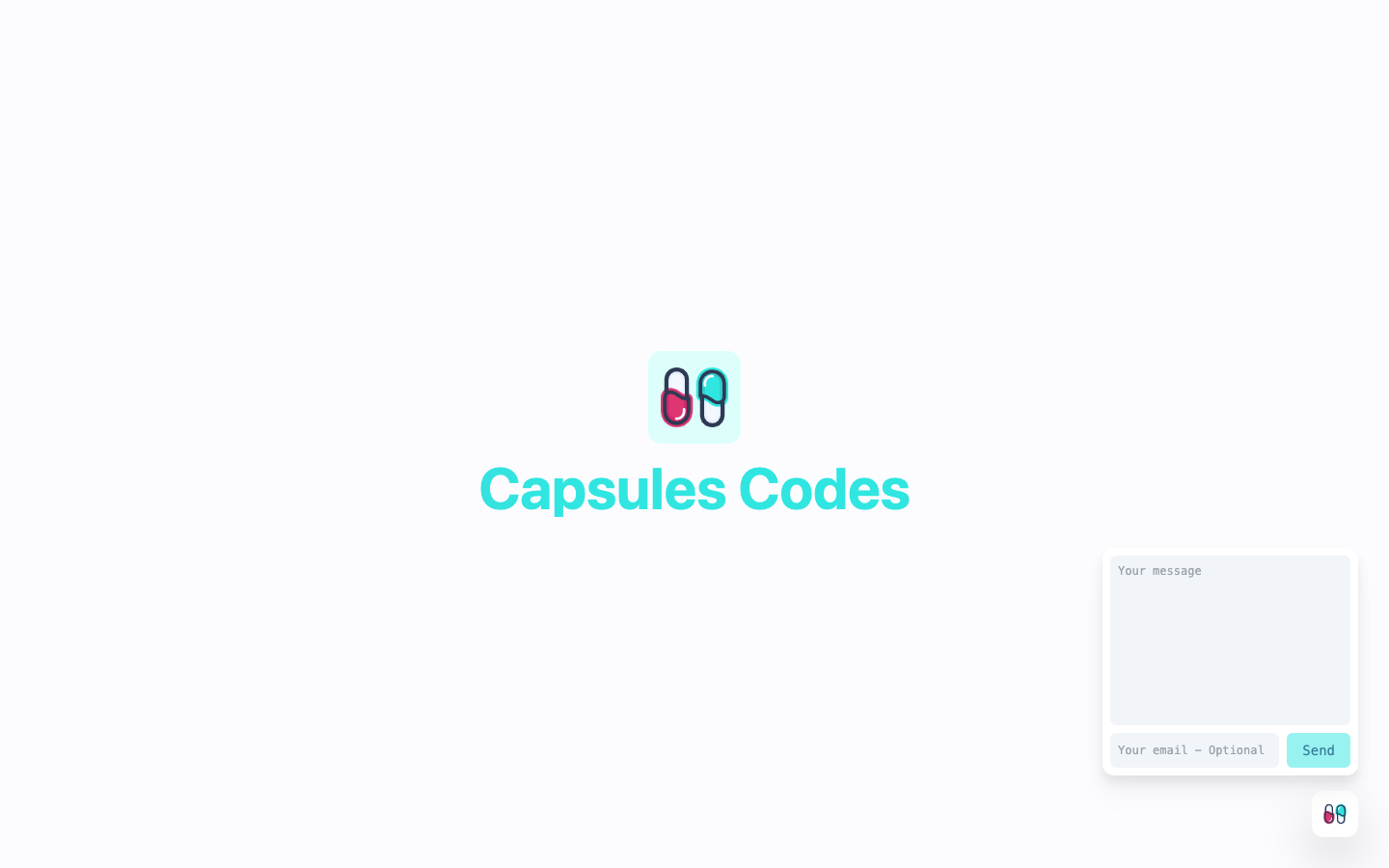
The Feedback component is imported and positioned at the bottom right of the screen. Now that the module is working on the client side, it's time to create the route, implement validation, and send the data to Slack. For this article, there is no need to create a specific controller.
app/Http/FeedbackRequest.php
<?php
namespace App\Http\Requests;
use Illuminate\Foundation\Http\FormRequest;
class FeedbackRequest extends FormRequest
{
public function rules() : array
{
return [
'message' => [ 'required', 'min:1', 'max:499' ],
'email' => [ 'sometimes', 'email' ],
];
}
}
The FeedbackRequest allows for returning errors if data has not been sent correctly.
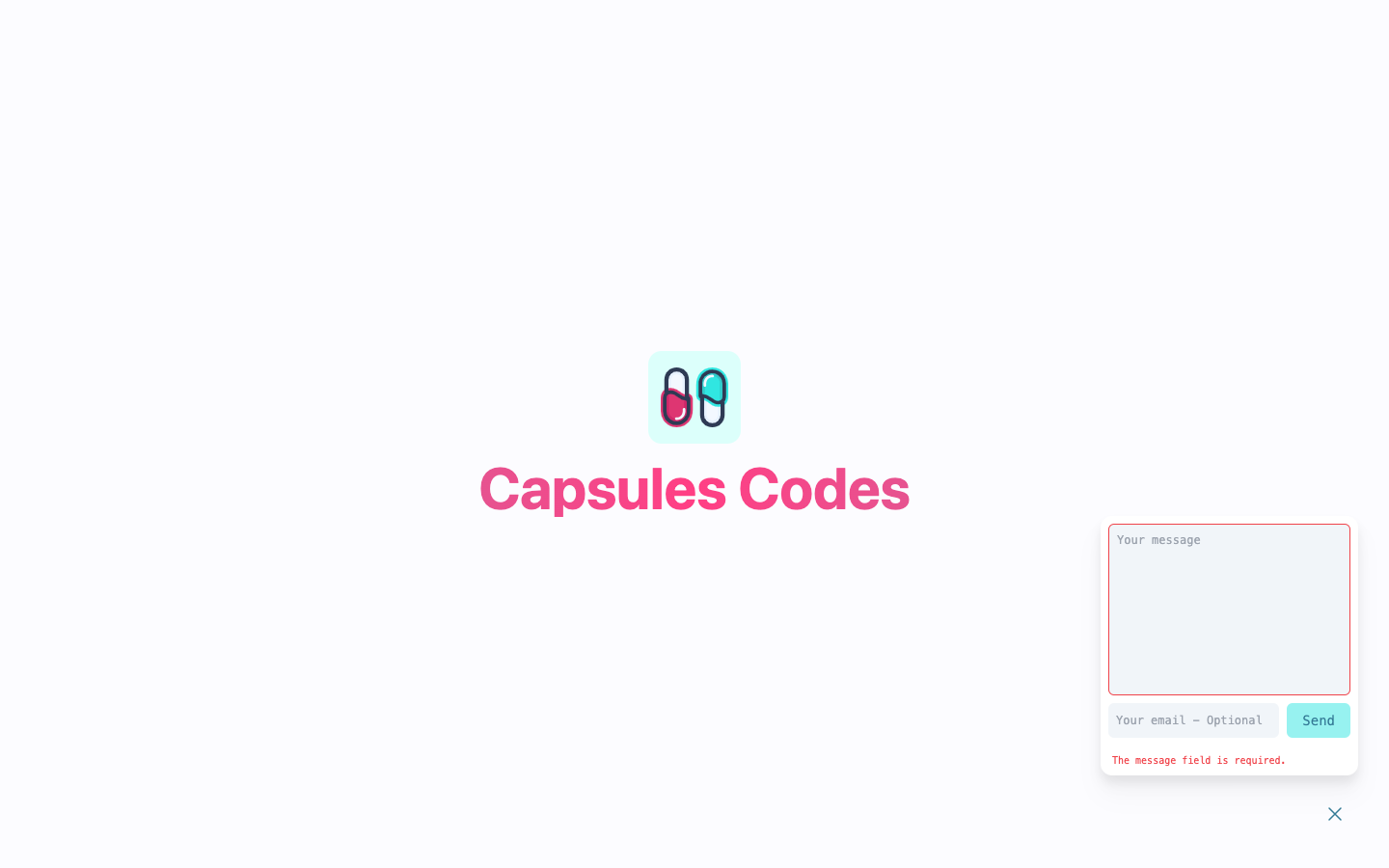
routes/web.php
<?php
use Illuminate\Support\Facades\Route;
use Inertia\Inertia;
use App\Http\Requests\FeedbackRequest;
Route::get( '/', fn() => Inertia::render( 'Welcome' ) );
Route::post( 'feedbacks', function( FeedbackRequest $request ){} );
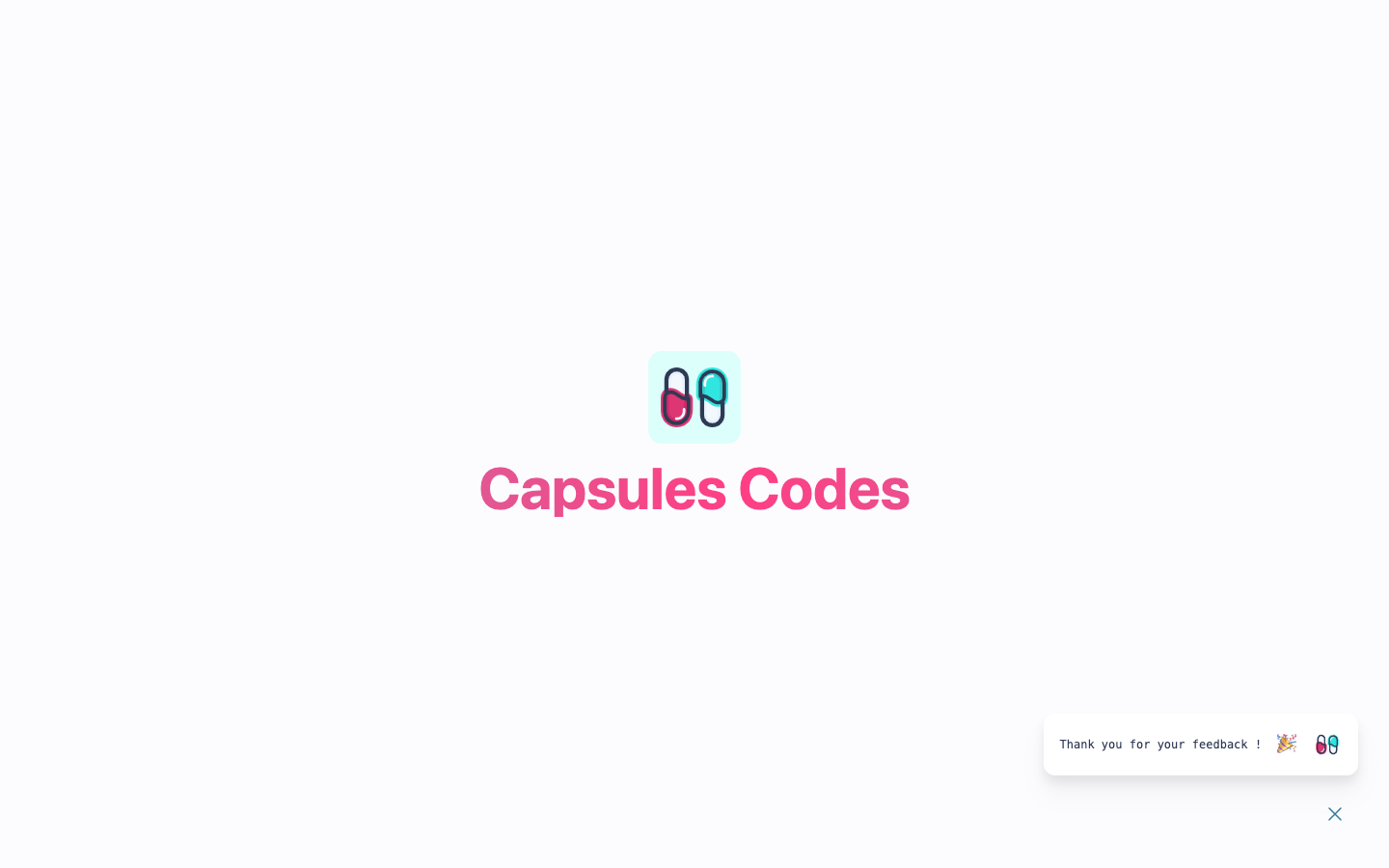
The next step is to connect the Laravel project to the Slack workspace. For this purpose, a Laravel package is available: laravel/slack-notification-channel.
composer require laravel/slack-notification-channel
Additionally, a Slack App creation is needed via this link. Click on Create New App > From scratch. Then, insert an app name and choose your Slack workspace. A Basic Information page will appear. Select the Incoming Webhooks feature and enable it. Click on Add New Webhook to Workspace and choose the channel in the workspace to receive notifications.
A webhook in the following format is then available :https://hooks.slack.com/services/{your-webhook-key}.
This webhook needs to be added to the LOG_SLACK_WEBHOOK_URL environment variable, which is accessible in the configuration file config/logging.php.
config/logging.php
'slack' => [
'driver' => 'slack',
'url' => env('LOG_SLACK_WEBHOOK_URL'),
'username' => 'Laravel Log',
'emoji' => ':boom:',
'level' => env('LOG_LEVEL', 'critical'),
'replace_placeholders' => true,
],
.env
LOG_SLACK_WEBHOOK_URL=https://hooks.slack.com/services/{your-webhook-key}
The notification can now be sent from the /feedbacks route.
routes/web.php
<?php
use Illuminate\Support\Facades\Route;
use Inertia\Inertia;
use App\Http\Requests\FeedbackRequest;
use Illuminate\Support\Facades\Notification;
use App\Notifications\FeedbackReceived;
Route::get( '/', fn() => Inertia::render( 'Welcome' ) );
Route::post( 'feedbacks', fn( FeedbackRequest $request ) => Notification::route( 'slack', config( 'logging.channels.slack.url' ) )->notify( new FeedbackReceived( $request ) ) );
All that's left is to create the FeedbackReceived notification.
app/Notifications/FeedbackReceived.php
<?php
namespace App\Notifications;
use Illuminate\Notifications\Notification;
use App\Http\Requests\FeedbackRequest;
use Illuminate\Notifications\Messages\SlackMessage;
class FeedbackReceived extends Notification
{
private FeedbackRequest $request;
public function __construct( FeedbackRequest $request )
{
$this->request = $request;
}
public function via() : array
{
return [ 'slack' ];
}
public function toSlack() : SlackMessage
{
$email = $this->request->email ?? 'Anonymous';
return ( new SlackMessage )->content( "New Capsules Codes Feedback : \"{$this->request->message}\" by {$email}" );
}
}
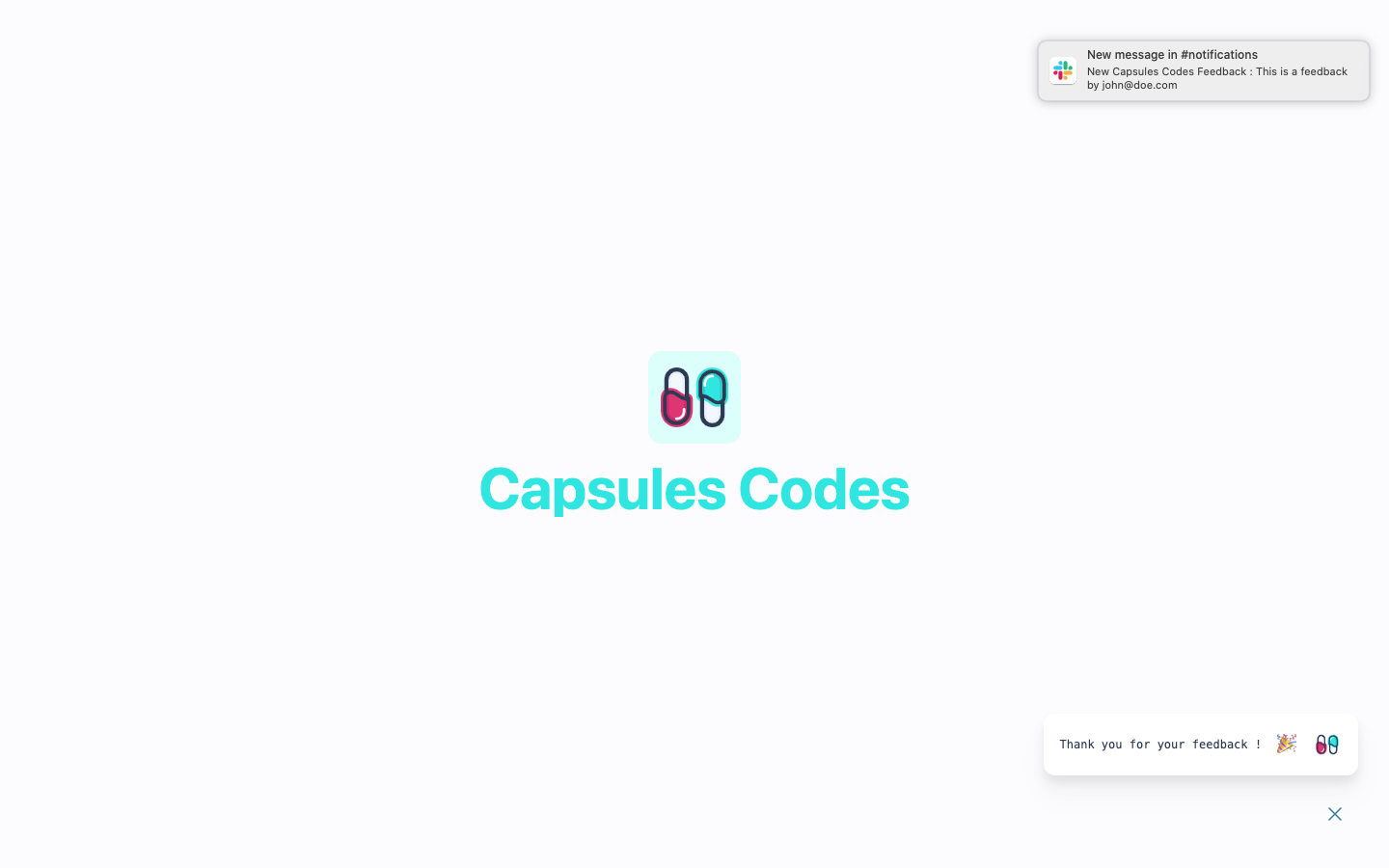
A wild notification appears!
Glad this helped.
Other articles you might like
 February 5th 2026
February 5th 2026
From 400-Line Import Controllers to 20-Line Configs in Laravel
The "Import Nightmares" We All Know If you've built business applications with Laravel, yo...
 February 4th 2026
February 4th 2026
How Big Tech Generates Initial-Based Avatars — And How You Can Do the Same in Laravel
If you’ve ever created an account on platforms like Google, GitHub, Slack, or Notion, you’ve seen it...
 January 24th 2026
January 24th 2026
Common Laravel Mistakes I See in Production (And How to Avoid Them)
Laravel makes it incredibly easy to build applications fast. But that same ease can lead to patterns...

The Laravel portal for problem solving, knowledge sharing and community building.






